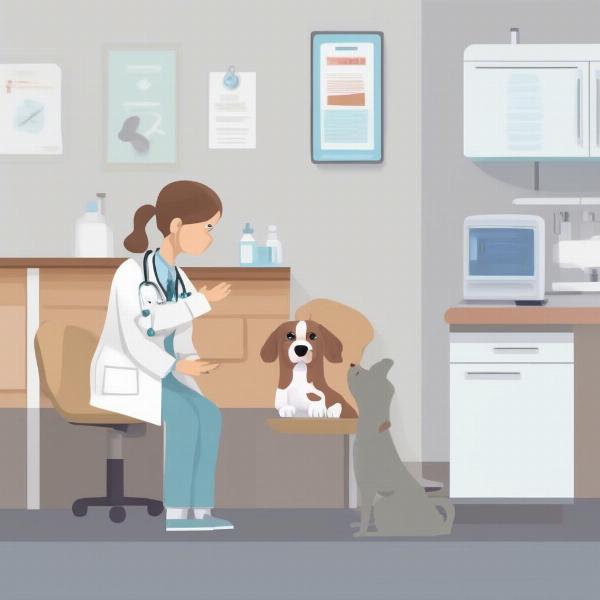A dog pooping calendar isn’t about marking down each bowel movement, but rather understanding your dog’s typical elimination patterns. Knowing your dog’s usual pooping frequency can be a valuable tool in monitoring their health. Changes in bowel movements can be an early indicator of digestive issues, dietary problems, or even stress. This article will delve into the factors influencing a dog’s pooping schedule and how to recognize potential problems.
Factors Affecting a Dog’s Pooping Frequency
Several factors influence how often your dog poops, including diet, age, activity level, and overall health. Puppies, with their smaller digestive systems and frequent meals, will poop more often than adult dogs. Similarly, highly active dogs might eliminate more frequently than sedentary dogs. Diet plays a significant role; highly digestible food results in less waste and therefore less frequent pooping.
Diet and Hydration
The quality and type of dog food directly impact stool formation. A high-fiber diet can increase stool bulk and frequency, while a low-fiber diet can lead to less frequent bowel movements. Hydration is also crucial; insufficient water intake can lead to harder stools and potential constipation.
Age and Activity Level
As mentioned earlier, puppies and active dogs tend to poop more often. Senior dogs might experience changes in their metabolism and digestive system, leading to less frequent or more irregular bowel movements.
Underlying Health Conditions
Changes in pooping frequency can be a symptom of various health issues, including parasites, infections, inflammatory bowel disease, and even stress. dog poop calendar helps you monitor these changes and identify potential problems early.
Recognizing Potential Problems
While there’s no set “normal” for a dog pooping calendar, consistency is key. A sudden change in frequency, consistency, or appearance of your dog’s poop warrants attention. Look out for signs like diarrhea, constipation, straining, or blood in the stool.
 Dog experiencing diarrhea at vet clinic
Dog experiencing diarrhea at vet clinic
Diarrhea and Constipation
Diarrhea can be caused by various factors, including dietary indiscretion, infections, or stress. Constipation, on the other hand, can result from dehydration, lack of fiber, or underlying medical conditions. Both scenarios require attention and possibly veterinary intervention.
Straining and Blood in Stool
Straining during bowel movements can indicate constipation or other digestive issues. Blood in the stool is a serious sign and requires immediate veterinary attention.
When to Consult a Veterinarian
If your dog exhibits any significant changes in their pooping habits, it’s essential to consult a veterinarian. They can diagnose the underlying cause and recommend appropriate treatment. Don’t hesitate to seek professional advice if you notice anything unusual.
Conclusion
While a dog pooping calendar isn’t a literal schedule, understanding your dog’s typical elimination patterns is vital for monitoring their health. By paying attention to frequency, consistency, and any changes in their bowel movements, you can detect potential problems early and ensure your furry friend receives the necessary care. A dogs pooping in beautiful places calendar may be fun, but a healthy dog is a happy dog.
FAQ
- How often should a dog poop? Most adult dogs poop once or twice a day, but this can vary.
- Is it normal for my dog to poop more after switching food? Yes, changes in diet can affect bowel movements.
- What does it mean if my dog’s poop is black and tarry? This can be a sign of bleeding in the upper digestive tract and requires immediate veterinary attention.
- How can I help my dog with constipation? Ensure they have access to plenty of fresh water and consider adding fiber to their diet.
- When should I be concerned about changes in my dog’s poop? Any sudden or significant changes in frequency, consistency, or appearance warrant a vet visit.
- Can stress affect a dog’s pooping habits? Yes, stress can lead to both diarrhea and constipation in dogs.
- What does a healthy dog poop look like? It should be firm, brown, and easy to pick up.
ILM Dog is your trusted source for expert advice on dog care and wellbeing. We offer a wealth of resources on dog breeds, health, training, nutrition, grooming, and much more. Our mission is to empower dog owners with the knowledge and tools they need to provide the best possible care for their canine companions. Whether you’re a seasoned dog owner or just starting out, ILM Dog is here to support you every step of the way. dogs pooping calendar provides further insights into this important aspect of dog health. Contact us today for personalized guidance: Email: [email protected], Phone: +44 20-3965-8624.